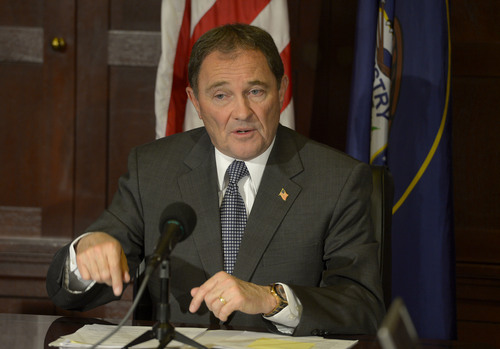This is an archived article that was published on sltrib.com in 2014, and information in the article may be outdated. It is provided only for personal research purposes and may not be reprinted.
Washington • Utah Gov. Gary Herbert says within 30 days he hopes to gain federal agreement on the most controversial part of his alternative plan to expand Medicaid in the state — the work requirement for able-bodied adults — and that new Health and Human Services Secretary Sylvia Burwell is receptive to the pilot program.
Herbert met Friday with Burwell to pitch his plan, which seeks a private-sector approach to covering those Utahns who don't qualify for Medicaid but can't afford their own insurance without government help. The governor says his team — which has met weekly with HHS staff — has reached agreement on 27 of the 35 points in the "Healthy Utah" plan and that the rest should fall into place by the end of August.
Burwell "seems to be very willing to give us maximum flexibility," Herbert said in an interview. "She says we're willing to use this as a demonstration project, as a pilot program — which is what I've proposed — to test theories, to see if there are other, better ways to help those who are the poor and working poor among us. She seems to be very receptive to what our proposal is in concept."
HHS officials are trying to find ways under the Affordable Care Act to include a work requirement, Herbert's key element in accepting federal funds to expand coverage.
Utah legislative leaders have said they don't plan to tackle any proposal to expand Medicaid coverage, including Herbert's alternative, until January's general session. But Herbert says he's optimistic that HHS could grant a waiver to allow his program to move forward and that the Legislature would convene a special session when all the details are in place.
HHS officials, he says, have offered to come to Utah to testify before lawmakers on how the plan would work if the waiver is granted.
"They recognize the naysayers out there who say it can't be done or shouldn't be done for whatever the reasons are, some political, some just from misinformation and misunderstanding," Herbert said. "We're trying to work through that."
Rep. Jim Dunnigan, R-Taylorsville, joined Herbert for the meeting with Burwell. Dunnigan has said the governor's proposal needs work.
House Speaker Becky Lockhart, R-Provo, said rising costs in Arkansas — which has a program similar to Herbert's — should be a red flag.
"For Utah, our concern has always been the long-term impact of any coverage proposal to the taxpayers," she wrote in an email.
If Herbert succeeds in obtaining a waiver, the federal government would hand over $258 million a year to help run the program.
The money would flow for three years after which, Herbert says, the state could pull out or continue with the program.
His plan would cover 110,000 Utahns, and recipients would have to kick in about $420 a year on average toward their health-care costs.



